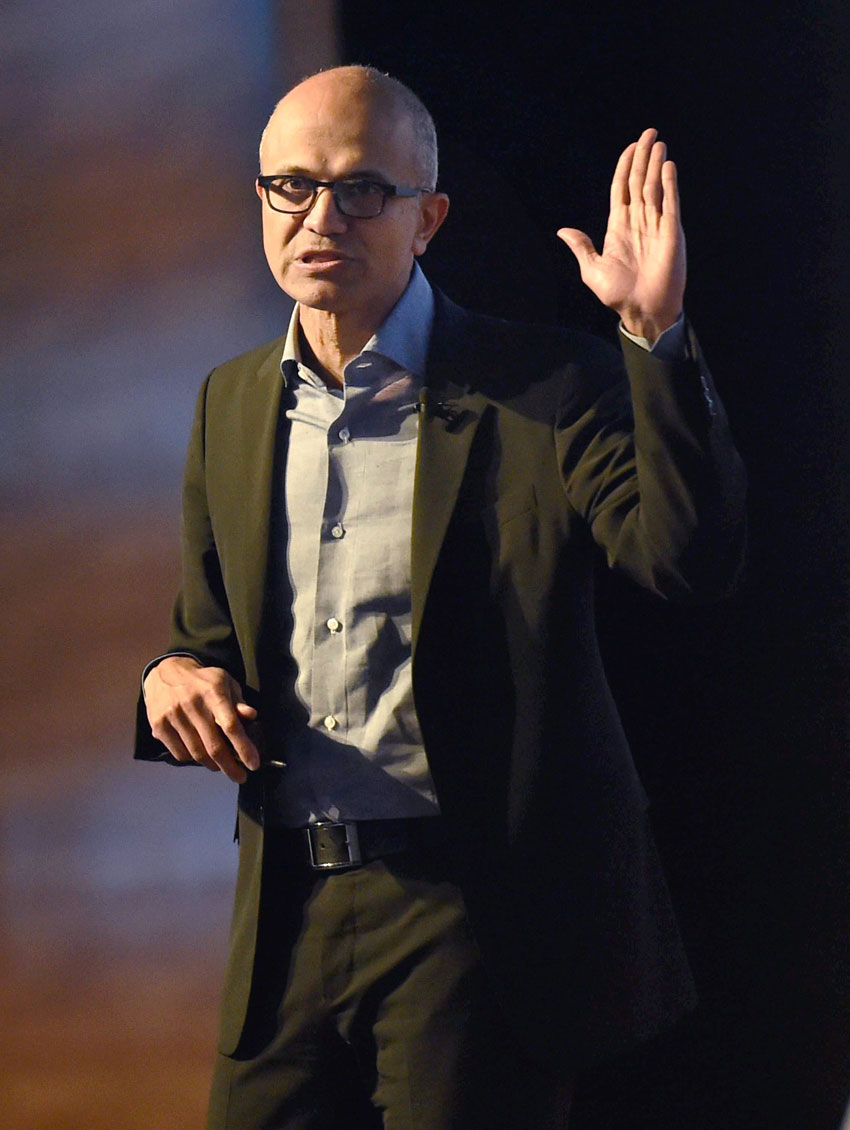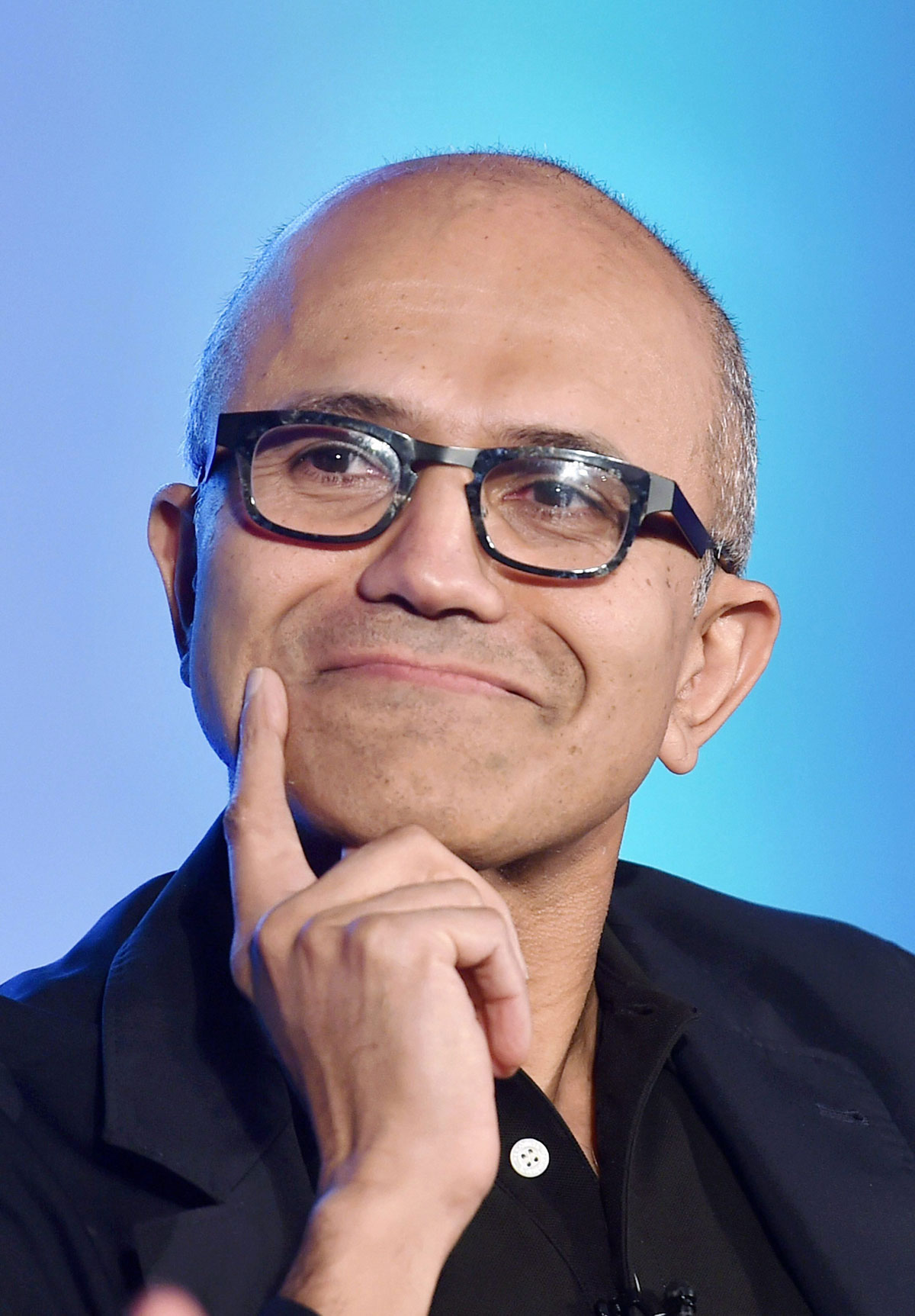Building Trust in Technology is Crucial: Microsoft’s Nadella
Microsoft CEO Satya Nadella in discussion with EkStep co-founder and chairman Nandan Nilekani during an event on startup stalwarts of India about digital information, intelligent cloud, AI, in Bengaluru, Feb. 20. (Shailendra Bhojak/PTI)
@Siliconeer #Siliconeer @Microsoft #Microsoft #SatyaNadella #Tech #Skype #Build2017 #LinkedIn – Microsoft CEO Satya Nadella attempted to allay concerns over the increasing use of technology in public life and said building trust was crucial to its utilization as a tool to “empower” people. Nadella also said that multinational companies need to give back to local communities and generate businesses for them to ensure long-term growth at a time when politicians from major countries are harping on nationalism, writes Lalit K. Jha.
Nadella also urged software developers to use technology to bring in “more and more people” within the global technological network.
“Building trust in technology is crucial… Ensure that there is more trust in technology each day. We have to capture the essence of the timeless value,” Nadella told the annual Microsoft developer’s conference ‘Build 2017’ in Seattle, May 10.
His remarks gain significance amid concerns raised about the use of technology both in the United States and India. The two largest democracies lately have been facing questions on the use of technology in elections with allegations of misuse hacking and tampering of devices and Internet quite often.
With people fast moving towards greater use of electronic devices, Nadella however said the opportunity for developers have never been so great as 90 percent of the data available today has been generated in the past two years.
But, he told the developers gathered from around the world, that “with this enormous opportunity comes enormous responsibility.”
“To me, the choice that we developers make have profound consequences,” he said, adding that there could be “unintended consequences” of the use of technology sometimes.
He called upon developers to ensure that some of the more “disputant scenarios” do not come true.
“I believe we can make these practical design choice that help enshrine our timeless values. We should empower people with technology… Let’s amplify their capabilities,” he said.

Nadella urged developers to use technology for people’s empowerment. “Let’s use technology to bring more people to be able to use technology and participate in the society.”
Nadella said the world is now moving from “a mobile first, cloud first to an intelligent cloud to an intelligent edge.” The user-experience is going to span across all devices, he said as he announced that Microsoft’s Windows has now reached 500 million Windows 10 monthly active devices.
He noted how together Windows, Microsoft Office and Microsoft Azure offer developers more than a billion opportunities to connect their innovations with customers.
Microsoft also announced new Azure data and cloud services to help developers quickly modernize their existing apps, new Artificial Intelligence (AI) and Azure services that allow any developer to more easily build intelligent apps, with understanding and natural user interaction capabilities, and showcased new data, IoT edge and AI services built for a future with an intelligent cloud and intelligent edge.
During the conference, Microsoft also highlighted its vision to amplify human ingenuity with intelligent technology, bringing AI to every developer through the unique combination of the Microsoft cloud and AI.
Multinationals Need to Create Local Opportunities
“Any company that just collects rent internationally will be in trouble,” Nadella told financial analysts at the company’s annual developers conference ‘Microsoft Build 2017’ in Seattle, May 11.
The 49-year-old Indian-American CEO underscored the need of multinational companies to give it back to local communities and generate businesses locally. This he said is important for any company’s long term growth.
“One just cannot set up shop and give nothing back, one has to ‘create local opportunity,’” he asserted during the three-day conference that kicked off May 10.
This becomes more relevant at a time when politicians in major countries are stressing on nationalism and challenging the decades-old globalization trend.
“Every head of state only cares about one thing: it is about their country first. In the U.S. it is about America first, and in Britain it is about Britain first,” he said, referring to U.S. President Donald Trump’s ‘America First’ policy.
Trump vowed to focus his foreign policy on American interests and American national security.
In April, he announced a new executive order to promote his America First agenda, ordering the federal government to implement his buy American, and hire American policies. Trump also called for a review of the H-1B visa program, saying they should never be used to replace American workers and be must given to the most skilled and highest paid applicants.
Nadella said companies must be able to show in terms of what they have done for that country.
“In terms of local taxes, in terms of local small business productivity, local large business competitiveness, their educational outcomes, their entrepreneurial work, that’s what matters,” said the Microsoft CEO.
Earlier in the day, Nadella said the global tech community is witnessing a major shift.
“Even the micro services, workflows, advanced analytics that people are building in the cloud are all pointing to what I think is a fundamental change in the paradigm of the apps that we are building, a change in the world view that we have.
We’re moving from what is today’s mobile-first, cloud-first world to a new world that is going to be made up of an intelligent cloud and an intelligent edge,” he said.
Nadella said the user experience is getting distributed across devices.
“It’s no longer just mobile first, in other words, it is not about one device, and app model for one device. The user experience itself is going to span all of your devices,” he said.
“Whether it’s precision medicine or precision agriculture, whether it’s digital media or the industrial internet, the opportunity for us as developers to have broad, deep impact on all parts of society and all parts of the economy has never been greater,” he said.
But with this enormous opportunity, comes enormous responsibility, he said.
Talking about Microsoft’s plan to push artificial intelligence in a big way, Nadella said he believes that the move would drive the company’s growth in the years to come and give it a distinct edge over other companies.
“IoT, big, big, big workload in the cloud. AI is everywhere. The ability to reason over large amounts of data, create intelligence, distribute it,” Nadella said in his key note address.
IoT stands for internet of things and AI means artificial intelligence in common technological parlance.
Nadella said even the micro services, workflows, advanced analytics that people are building in the cloud are all pointing to what is a fundamental change in the paradigm of the apps being build, a change in the world view that they have.
“We’re moving from what is today’s mobile-first, cloud- first world to a new world that is going to be made up of an intelligent cloud and an intelligent edge,” he said.
Describing artificial intelligence as the “big change” happening in the tech industry, Nadella said in his keynote address gave a demonstration of how AI is headed to become a key part of businesses and even day-to-day work and how it is likely to have a great impact on everyone’s daily life.
“So as you see the experience as well as data and AI getting distributed, there needs to be a fundamental change in the inner and the outer loop of what we as developers do.
Continuous integration, continuous deployment is going to change. And that’s where things like micro services, containers are playing a massive role in the outer loop,” he said.
But one of the things that is going to completely change about logic is serverless.
“In a world where things get more distributed, event driven, you want to be able to write logic that reacts to these events, is not static. That means you don’t have a piece of logic just being bound and running on one virtual machine in one location, but it’s something that can actually be mobile,” he said.


